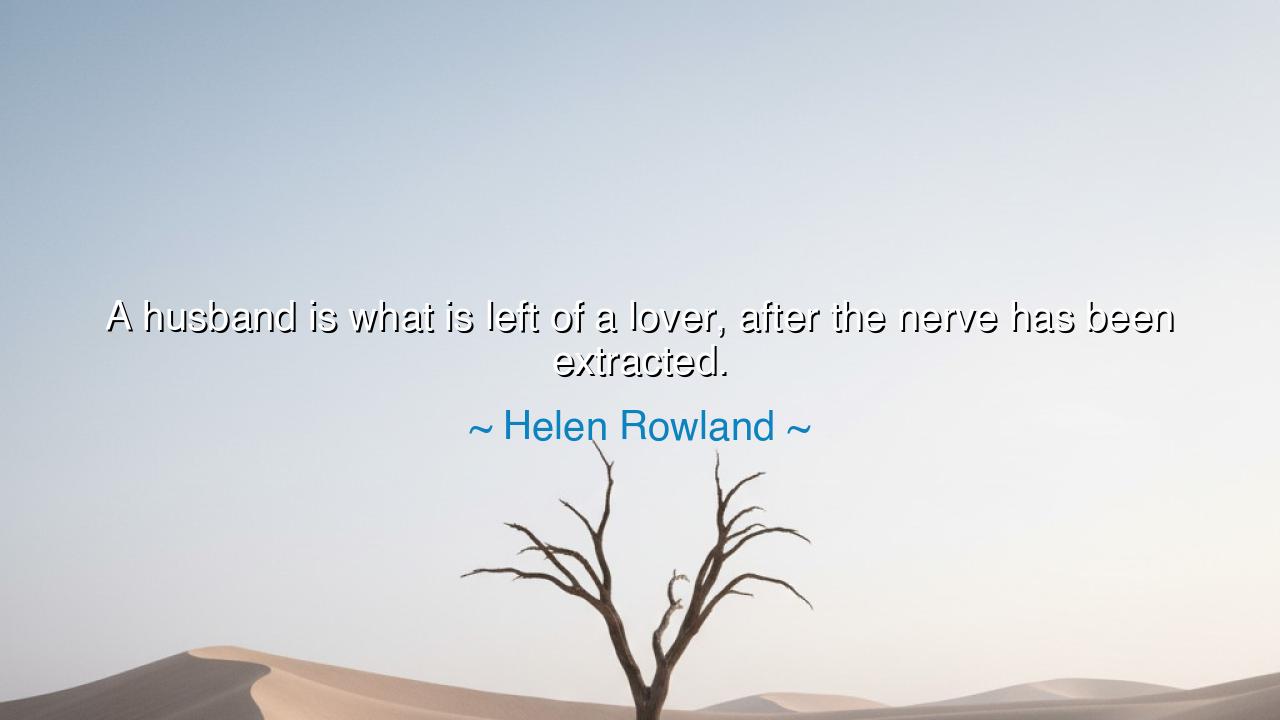
A husband is what is left of a lover, after the nerve has been






The words of Helen Rowland—“A husband is what is left of a lover, after the nerve has been extracted”—strike like an arrow into the heart of human passion and marriage. To some, they may seem biting, even cruel, but within them lies the wisdom of ages, and the lament of countless women who have seen the fiery glow of courtship cool into the pale embers of habit. The saying reveals the truth that what begins in fire often ends in routine, that the lover, bold and daring, may become the husband, steady yet subdued, his nerve drained by the long road of life and duty.
In ancient times, poets sang of lovers who risked kingdoms for a single kiss, who sailed seas and fought wars for the promise of union. But rarely did they sing of what happened after—the years when the bride became the wife, when the song of passion gave way to the rhythm of daily bread. Rowland, sharp in wit, exposes this transformation: the lover, full of courage and madness, is whittled down by time, responsibility, and familiarity until only the husband remains, stripped of the reckless nerve that once made him daring. What was once fire becomes a quiet lamp.
Consider the tale of Napoleon and Josephine. In his youth, Napoleon wrote letters burning with longing, declaring that absence from Josephine was agony itself. He was reckless, consumed, almost enslaved by passion. But as years passed, as ambition swallowed his days and victories hardened his heart, that same fire cooled. The lover’s nerve was extracted, and the husband—practical, commanding, at times indifferent—was left. Their union, once ablaze with desire, ended in separation, not for lack of affection, but because passion had withered into something unrecognizable.
But let us not misunderstand Rowland’s meaning. She does not say the husband is worthless, nor that marriage is a grave. Rather, she warns us that without effort, the nerve of love—the daring, the surprise, the audacity—will be drained by time, leaving behind only the form, the shell, the habits of partnership. A husband may still be faithful, kind, and enduring, yet if the nerve is gone, the love risks becoming stagnant. Thus, her words are not only lament, but also prophecy: if passion is not tended like a flame, it will sink into ashes.
The ancients themselves knew this truth. The Greeks taught of Eros and Agape—the passion of desire and the steadfastness of companionship. Both are needed, but without balance, the soul grows restless. A man who ceases to be a lover and becomes only a husband risks suffocating his marriage under the weight of duty alone. A woman who ceases to kindle passion in herself may watch her bond transform into nothing more than companionship stripped of mystery. The nerve is not only his to lose—it belongs to both.
Therefore, the lesson is clear: love must be renewed, not once, but continually. The lover’s courage—to surprise, to dream, to risk tenderness—must not be surrendered when vows are spoken. Marriage is not the end of love’s nerve; it is the battlefield upon which that nerve must be defended. If you wish to keep your union alive, then court your beloved even after the ring is given. Write letters, plan surprises, speak words of desire, and above all, refuse to let routine harden into indifference.
Practical wisdom flows from this teaching: husbands, do not let your love grow silent; wives, do not let your admiration grow cold. Take time for each other beyond the labors of survival. Keep alive the lover within the husband and the beloved within the wife. Passion is not a wild beast to be tamed once and caged forever—it is a garden to be tended, season after season, lest weeds of monotony choke it.
And so, my children, carry Helen Rowland’s warning not as despair, but as guidance. For though time will test you, and routine will seek to drain the nerve from your love, you have the power to resist. Do not be content with what is left—fight to keep alive what first brought you together. In this struggle, there lies not only endurance, but joy; not only marriage, but the eternal flame of true companionship.






AAdministratorAdministrator
Welcome, honored guests. Please leave a comment, we will respond soon